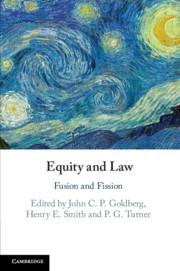Book contents
- Equity and Law
- Equity and Law
- Copyright page
- Contents
- Figures
- Table
- Contributors
- Acknowledgements
- Abbreviations
- Table of Cases
- Statutes
- 1 Fusion and Theories of Equity in Common Law Systems
- Part I Legal Systems and Legal Institutions
- 2 Equity
- 3 The Union of Law and Equity
- 4 What Did the Makers of the Judicature Acts Understand by ‘Fusion’?
- 5 At the Crossroads of Fusion
- 6 Fusion–Fission–Fusion
- 7 Fusion without Fission
- 8 Are Equity and Law in Scotland Fused, Separate or Intertwined?
- Part II Fusion and Fission in Doctrine and Practice
- Part III Functional, Analytical and Theoretical Views
- Index
3 - The Union of Law and Equity
The United States, 1800–1938
from Part I - Legal Systems and Legal Institutions
Published online by Cambridge University Press: 26 July 2019
- Equity and Law
- Equity and Law
- Copyright page
- Contents
- Figures
- Table
- Contributors
- Acknowledgements
- Abbreviations
- Table of Cases
- Statutes
- 1 Fusion and Theories of Equity in Common Law Systems
- Part I Legal Systems and Legal Institutions
- 2 Equity
- 3 The Union of Law and Equity
- 4 What Did the Makers of the Judicature Acts Understand by ‘Fusion’?
- 5 At the Crossroads of Fusion
- 6 Fusion–Fission–Fusion
- 7 Fusion without Fission
- 8 Are Equity and Law in Scotland Fused, Separate or Intertwined?
- Part II Fusion and Fission in Doctrine and Practice
- Part III Functional, Analytical and Theoretical Views
- Index
Summary
David Dudley Field was the architect of the union – or fusion or merger – of equity and law in New York state, and the Field Code was widely adopted in other states. Field’s vision of the union of law and equity has prevailed in the United States, including at the federal level, at least in theory. However, the practise of law and acts of the courts indicate that the reality is rather different. Equity was not sundered by the Field Code or its federal counterpart, the Federal Code of Civil Procedure 1938. Equity continues to operate distinctly in various ways, even if it is less well understood now. Field’s own behaviour as an attorney was also ambivalent: where he maintained a strong posture against equity in theory, his practice as an attorney revealed his willingness to continue to recognise and rely on equity even under his Code.
Keywords
- Type
- Chapter
- Information
- Equity and LawFusion and Fission, pp. 46 - 69Publisher: Cambridge University PressPrint publication year: 2019



